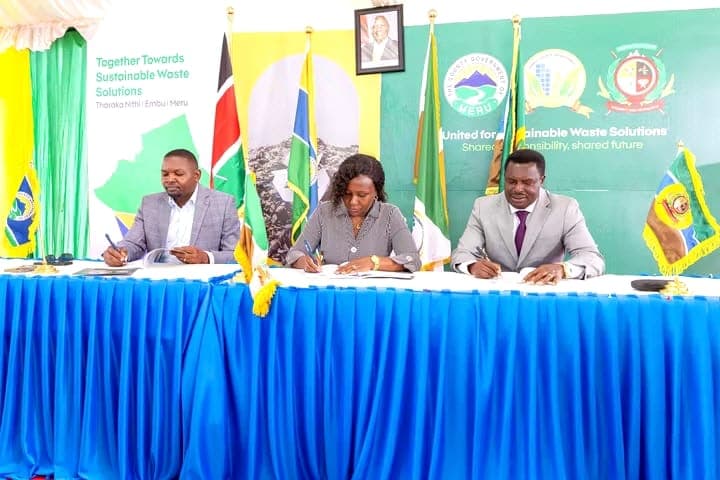We're loading the full news article for you. This includes the article content, images, author information, and related articles.
The agreement between Meru, Embu, and Tharaka Nithi counties aims to tackle the region's mounting waste crisis by creating a circular economy, boosting agriculture, and generating green jobs, setting a potential blueprint for devolved environmental management in Kenya.

In a landmark move for regional cooperation, the county governments of Meru, Embu, and Tharaka Nithi have signed a Memorandum of Understanding (MoU) to jointly manage waste across the Mt Kenya East region. The pact, signed on Thursday, October 23, 2025, at the Tharaka Nithi County Headquarters in Kathwana, brings together Governors Isaac Mutuma (Meru), Cecily Mbarire (Embu), and Muthomi Njuki (Tharaka Nithi) in a unified effort to transform a pressing environmental challenge into a significant economic opportunity.
The three counties collectively generate an estimated 1,350 tonnes of waste daily, a figure that has strained existing disposal sites and poses a threat to the region's sensitive ecosystems. Embu Governor Cecily Mbarire highlighted the limitations of individual county efforts, noting that dumpsites like Kagonga in her county are filling up faster than they can be managed. The agreement marks a strategic shift from isolated county-level initiatives to a collaborative, resource-pooling model. "Individually, none of us has enough waste to attract an investor," Governor Njuki stated, emphasizing that a collective approach creates the critical mass needed for large-scale investment.
The centerpiece of the agreement is the establishment of a joint waste processing and recycling plant. This facility will be designed to convert the region's vast quantities of waste into valuable commodities, primarily organic fertilizer and clean energy. This aligns with the region's economic backbone, as approximately 80% of the economic activity in the three counties is agriculture-based. An estimated 57% of the waste generated is organic, presenting a direct opportunity to support local farmers. "We are saying as MET (Meru, Embu, Tharaka Nithi), if we are producing 57% organic as waste, then we already have a solution to what we normally import from outside," Governor Njuki explained, referencing Kenya's heavy reliance on imported fertilizers.
Beyond agriculture, the pact aims to create a circular economy that will generate green jobs for the youth in waste collection, sorting, transportation, and at the recycling facility itself. The initiative also has a strong conservation component, with a key goal being the protection of the Mt Kenya ecosystem, including addressing pollution at critical sites like the Lake Nkunga dumping site.
This regional initiative is strongly aligned with national environmental policy. The Sustainable Waste Management Act of 2022 mandates that county governments establish infrastructure for waste segregation, recovery, and recycling. The National Environment Management Authority (NEMA) has recently been pushing counties to comply with the Act, issuing directives for the establishment of Material Recovery Facilities and the proper segregation of waste at the source. This tri-county model represents a proactive step towards implementing these national requirements.
To bring the project to fruition, the counties will partner with the Jospong Group, a Ghanaian company with extensive experience in waste management across Africa. The Jospong Group is known for developing integrated waste management systems, including recycling and composting plants, in countries like Ghana and Zambia, often through public-private partnerships. A Special Purpose Vehicle will be established to facilitate the collaboration with the investor, ensuring a structured approach to financing, design, and management of the regional plant.
While the agreement has been met with optimism from environmental advocates and residents, its implementation will require sustained political will and careful planning. Key challenges that often face inter-county projects in Kenya include securing adequate funding for large-scale infrastructure, navigating political complexities between administrations, and ensuring transparent and equitable benefit-sharing. The success of this pact will depend on the three governors' ability to maintain a unified vision and effectively manage the public-private partnership.
The establishment of a viable economic model for the recycled products, particularly organic fertilizer, will also be crucial. While the demand is high, ensuring consistent quality, effective marketing, and competitive pricing for local farmers will be key to the project's long-term sustainability. If successful, the Mt Kenya East initiative could serve as a powerful blueprint for other regions in Kenya and East Africa, demonstrating how devolved governments can collaborate to solve complex environmental problems while fostering local economic development. The focus now shifts from the signed MoU to the concrete steps of implementation, a process that will be closely watched by policymakers and citizens alike.
Keep the conversation in one place—threads here stay linked to the story and in the forums.
Other hot threads
E-sports and Gaming Community in Kenya
Active 8 months ago
The Role of Technology in Modern Agriculture (AgriTech)
Active 8 months ago
Popular Recreational Activities Across Counties
Active 8 months ago
Investing in Youth Sports Development Programs
Active 8 months ago
Key figures and persons of interest featured in this article